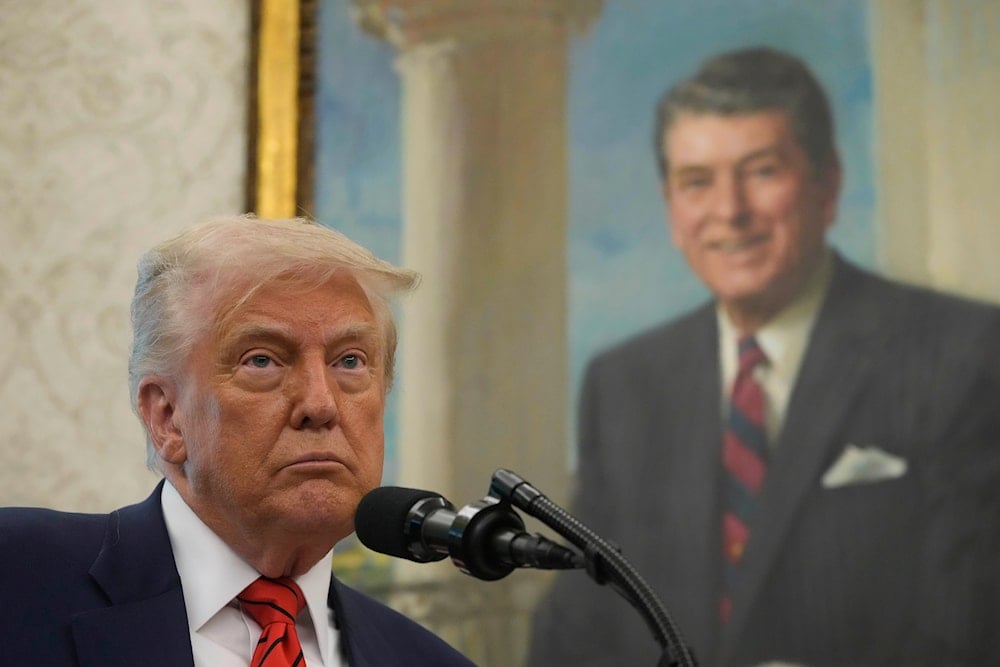US prioritizes shipping, not 'Israel', in ceasefire deal with Yemen
A new report by Globes reveals how Trump’s truce with Ansar Allah signals a shift in US foreign policy, potentially undermining "Israel’s" interests.
-

President Donald Trump speaks before Steve Witkoff is sworn in as special envoy during a ceremony in the Oval Office of the White House, Tuesday, May 6, 2025, in Washington, with a portrait of former President Ronald Reagan in the background (AP)
Donald Trump’s unexpected decision to broker a truce with Yemen’s Ansar Allah has taken Israeli officials by surprise, highlighting a growing strategic rift between "Israel" and the US, a new report by Globes argues. The crux of the issue lies not in a lack of pro-"Israel" voices within Trump’s administration but in the stark reality that US policy under Trump remains firmly grounded in the “America First” approach.
From Washington’s perspective, the Ansar Allah threat, as per the report, is primarily about commercial disruption, particularly attacks on international shipping in the Red Sea that have rerouted global trade and harmed supply chains.
Trump sees restoring shipping lanes to their pre-war function, where 14% of global trade passed through the Red Sea, as mission accomplished, according to the report.
That calculus may benefit Egypt, which is reportedly losing $800 million a month from diminished Suez Canal traffic. But for "Israel", the ceasefire is far more problematic, the report clearly states.
Targeting 'Israel' excluded from truce
Ansar Allah has made it clear they will continue targeting "Israel". As international pressure mounts on shipping firms to return to Red Sea routes, some may opt to bypass Israeli ports altogether to avoid confrontation, bringing the specter of a real economic blockade closer than ever.
Trump, meanwhile, is focused on strategic advantage and financial return. He recently unblocked weapons shipments that had been frozen under President Joe Biden, moves that serve both "Israel’s" defense needs and US arms manufacturers.
Yet, his upcoming trip to the Middle East notably skips "Israel", with stops planned in Saudi Arabia, the UAE, and Qatar, Washington’s major defense clients and hosts to key US military assets like Al Udeid Air Base.
Deep rift surfaces
The rift goes deeper than shipping or diplomatic snubs. Iran’s nuclear ambitions do not command the same urgency in Washington, as per the report. The Trump administration is reportedly pursuing a revised nuclear agreement resembling a tightened version of the JCPOA, the same deal it abandoned in 2018.
Globes frame the ceasefire with Ansar Allah as part of a broader US-Iranian détente. This shifting US posture raises deeper concerns for "Israel’s long-term defense planning". The current US-"Israel" military aid agreement, signed in 2016 and effective through 2028, is nearing expiration.
Aid packages at risk
Unlike the last round of negotiations, which began years in advance, "Israel" is reportedly falling behind schedule. If this trend continues, Globes warns, "Israel" could face the prospect of entering 2029 without a guaranteed aid package from its closest ally, a first in three decades.
In short, the truce may be a diplomatic victory for Trump and a logistical win for global shipping, but for "Israel", it marks a strategic setback and a wake-up call.

 3 Min Read
3 Min Read










